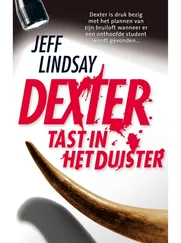Still, it was not the sort of thing I could say in the ICU without causing a certain amount of negative feeling to be directed toward me, so I mumbled something appropriate and we went back to sit at Deborah's bedside. Wilkins was still at the door, and there had been no change in Deborah that I could see, and no matter how long we sat or how hard we looked at her nothing happened, except for the hum, click, ping of the machinery.
Chutsky stared at her, as if he could make her sit up and speak by the power of his gaze. It didn't work. After a time he switched his stare to me. “The guy who did this” he said. “They got him, right?”
“He's locked up” I said. “At the detention center.” Chutsky nodded and looked like he was going to say something else. He looked toward the window, sighed, and then went back to staring at Deborah.
Dexter is known far and wide for the depth and sharpness of his intellect, but it was nearly midnight before it occurred to me that there was no point in sitting and staring at Deborah's unmoving form. She had not leapt to her feet from the Uri Geller intensity of Chutsky's gaze, and if the doctors were to be believed she was not going to do anything at all for some time. In which case, instead of sitting here and slowly sagging into the floor and morphing into a hunched, red-eyed lump, it made more sense for Dexter to totter off to bed for a few squalid hours of slumber.
Chutsky offered no objection; he just waved his hand and muttered something about holding down the fort, and I staggered out of the ICU into the warm and wet Miami night. It was a pleasant change after the mechanical chill of the hospital, and I paused to breathe in the flavor of vegetation and exhaust fumes. There was a large chunk of evil yellow moon floating in the sky and chuckling to itself, but I did not really feel its pull. I could not concentrate at all on the joyous matching gleam a knife blade would give off or the wild night-time dance of shadowy delight I should be longing for.
Not with Deborah lying unmoving inside. Not that it would be wrong -1 just didn't feel it. I didn't feel anything at all except tired, dull and empty.
Well, I couldn't cure the dull and empty, and I couldn't cure Deborah, but at least I could do something about the tired part.
I went home.
I woke up early, with a bad taste in my mouth. Rita was already in the kitchen and she had a cup of coffee in front of me before I could even settle into a chair. “How is she?” she said.
“It's too soon to tell” I said, and she nodded.
“They always say that” she said.
I took a large slug of the coffee and stood back up. “I'd better check and see how she is this morning” I said. I grabbed my cell phone from the table by the front door and called Chutsky.
“No change” he said, in a voice that was rough with fatigue. “I'll call you if anything happens.” I went back to the kitchen table and sat, feeling like I might fall into a coma myself at any minute. “What did they say?” Rita asked.
“No change” I told her, and I slouched forward into the coffee cup.
Several cups of coffee and six blueberry pancakes later I was somewhat restored and ready to go to work. So I pushed back from the table, said goodbye to Rita and the kids, and headed out the door. I would go through the motions like always, and let the ordinary rhythm of my artificial life lull me into synthetic serenity.
But work was not the sanctuary I had expected. I was greeted everywhere with sympathetic frowns and hushed voices asking, “How is she?” The entire building seemed to be throbbing with concern and echoing with the battle cry of, “It's too soon to tell.” Even Vince Masuoka had gotten into the spirit. He had brought in doughnuts —the second time this week! —and in a spirit of pure sympathetic kindness he had saved me the Bavarian Creme.
“How is she?” he asked, handing me the doughnut.
“She lost a lot of blood” I told him, mostly for the sake of some variety before I wore out my tongue from saying the same thing so many times. “She's still in ICU.”
“They're pretty good at this stuff at Jackson” he said. “Lots of practice.”
“I'd rather have them practice on someone else” I said, and ate the doughnut.
I had been in my chair for less than ten minutes when I got a call from Captain Matthews” executive assistant, Gwen. “The captain wants to see you right away” she said.
“Such a beautiful voice —it can only be that radiant angel Gwen,” I said.
“He means right now” she said, and hung up. And so did I.
I was in the captain's outer office in just under four minutes, looking at Gwen in person. She had been Matthews” assistant forever, all the way back to when she was called a secretary, and for two reasons. The first was that she was incredibly efficient. The second was that she was incredibly plain, and none of the captain's three wives had ever been able to find the slightest objection to her.
The combination of these two things made her irresistible to me, as well, and I was unable to see her without letting some lighthearted jest fly out from my frothy wit. “Ah Gwendolyn,” I said.
“Sweet siren of South Miami.”
“He's waiting for you” she said.
“Never mind him” I said. “Fly away with me to a life of beautiful debauchery.”
“Go on in” she said, nodding at the door. “In the conference room.”
I had assumed that the captain would want to express official sympathy, and the conference room seemed like a strange place to do that. But he was the captain and Dexter a mere underling, so I went on in.
Captain Matthews was, indeed, waiting for me. So were a few other people, most of whom I recognized, and none of whom were particularly good news. There was Israel Salguero, who was head of Internal Affairs; he was bad news all by himself. But he was also joined by Irene Cappuccio whom I knew only by sight and reputation. She was the senior lawyer for the department, and rarely called in unless somebody had filed a credible and substantial law suit against us. Sitting beside her was another department lawyer, Ed Beasley.
Across the table was Lieutenant Stein, Information Officer, who specialized in spinning things to keep the whole force from looking like a rampaging gang of visigoths. Altogether, this was not a group calculated to make Dexter sink into a chair wrapped in a soft cloud of tranquility.
There was a stranger sitting in one of the chairs by Matthews, and it was clear from the cut of his apparently expensive suit that he was not a cop. He was black, with a look of important condescension on his face and a shaved head that gleamed so brightly I was sure he used furniture polish, and as I watched he twitched his arm so that the sleeve rolled up to reveal a large diamond cufflink and a beautiful Rolex watch.
“Morgan” Matthews said, as I hovered in the doorway fighting down a sense of panic. “How is she?”
“Too soon to tell,” I said.
He nodded. “Well, I'm sure we all, ah, hope for the best here” he said. “She's a fine officer, and her dad was, uh —your dad, too, of course.” He cleared his throat and went on. “The, uh, doctors at Jackson are the best, and I want you to know that if there's anything the department can do, um ...” The man beside him glanced up at Matthews, and then at me, and Matthews nodded. “Sit down” he said.
I hooked a chair back away from the table and sat, with no idea what was going on, but an absolute certainty that I wouldn't like it.
Captain Matthews confirmed my opinion right away. “This is an informal conversation” he said. “Just to, ah, ahem.” The stranger turned his large and brittle eyes on the captain with a somewhat withering expression, and then looked back at me. I represent Alex Doncevic” he said.
Читать дальше












